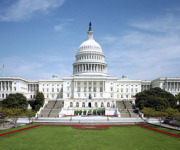Rules of enragement: The filibuster and Senate reform
In This Series
-
PBS on Senate dysfunction and filibuster abuse [VIDEO]
Over the weekend, the PBS show Need to Know ran a fantastic piece on Senate dysfunction, focused in particular on filibuster abuse. It features Sen. Tom Udall, a big supporter of Senate rules reform, and George Packer, who wrote a stellar piece on Senate dysfunction for The New Yorker earlier this year. It's a lot of good info packed in 15 minutes.
-
Blocking the Senate should be hard work
The Senate's not working because it doesn't take any work to stop it from working -- and that's what the Republicans are interested in doing. Current rules make stopping the Senate from doing its work the easiest thing in the world to do. That's got to change.
-
A plan to change the Senate's rules and make the Senate work again
The Senate clearly isn't working, and the frustration is being felt outside and inside the body. I challenge my colleagues and all of you to support my Constitutional option for changing the rules and making the Senate function again.
-
The filibuster undermines democratic accountability
The filibuster stands today as the single most important impediment to the significant reforms needed in America's climate/energy policies, its immigration policies, its labor law policies, and its need for a functioning judiciary. But beyond that, the filibuster has become a critical force undermining the workings of democratic accountability.
-
The filibuster is what enables the 'secret hold' in the Senate
Besides blocking legislation that enjoys majority support from coming to a vote, the filibuster lies at the heart of a number of disruptive and anti-democratic practices in the Senate, including the so-called "secret hold." The secret hold helped delay Senate action for so long that time ran out for a climate bill.
-
There is no constitutional right to filibuster
Debates about Senate procedural reform very often have constitutional undertones. Some claim that senators with strong, minority-held viewpoints have a constitutional right to prolong debate, even indefinitely. A related, more nuanced, argument begins by pointing out that our Founders envisioned the Senate as a careful, deliberative body that would check the rashness of the House of Representatives. Accordingly, some argue, the Framers intended that Senators be able to debate without limit. I am going to address and -- I hope -- refute each of these claims.
-
The filibuster is giving enviros unwarranted self-esteem issues
The dysfunctional state of the Senate has damaging consequences that extend into virtually every corner of American politics. There's just one in particular I want to focus on today, namely: it gives progressives a complex!




